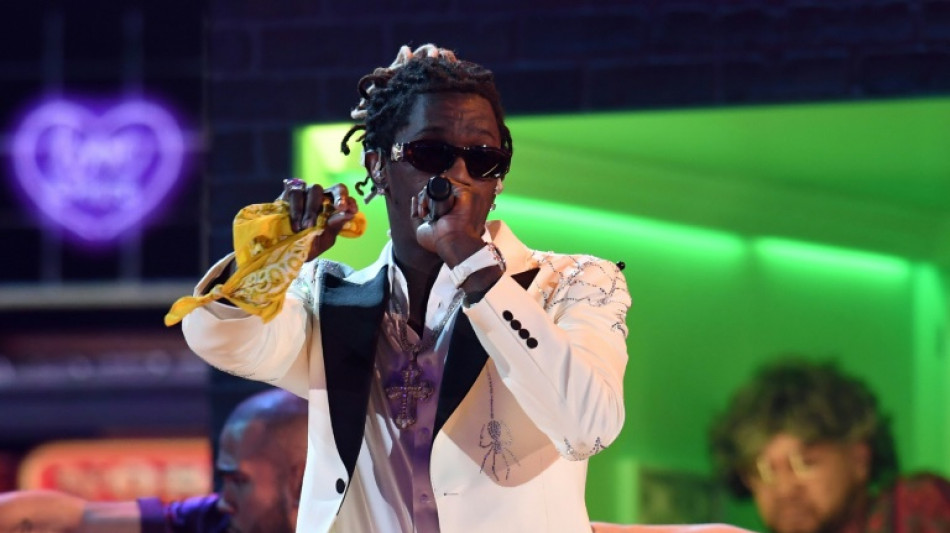
Rapper Young Thug set to go on trial for gang conspiracy

A sprawling gang conspiracy trial involving US rapper Young Thug is expected to begin Monday, with prosecutors alleging the Atlanta artist's record label to be a front for a crime ring.
The influential hip hop star born Jeffery Williams was one of more than two dozen people charged last spring by a Georgia grand jury, which said those named belong to a branch of the Bloods street gang, identified as Young Slime Life, or YSL.
The indictment shook the rap world in Atlanta -- a nexus of hip hop for years and where Young Thug is considered among the industry's most impactful figures forging contemporary rap's sound.
Georgia prosecutors hit all defendants with conspiring to violate the state's criminal racketeering law, which is modeled off the federal RICO Act.
In its early days, that statute was used to go after the mob, and more recently it took down the disgraced R&B singer R. Kelly for sex crimes.
Alleged individual crimes supporting the YSL conspiracy charge include murder, assault, carjacking, drug dealing and theft.
Young Thug, who founded the hip hop and trap label YSL Records in 2016, also faces one count of participation in criminal street gang activity.
Defense lawyers insist YSL -- also known as Young Stoner Life Records -- represents nothing more than a label and vague association of artists.
Controversially, prosecutors are holding up rap lyrics from musicians including Young Thug as well as Gunna -- who was also charged but took a plea deal -- and even a bar from a posthumous Juice WRLD single.
"I think if you decide to admit your crimes over a beat, I'm going to use it," said Fani Willis, the district attorney of Fulton County, which includes Atlanta.
- 'Rap on Trial' -
It's far from the first time hip hop lyrics have featured in courtrooms, a practice that's sparked controversy numerous times over the past decades.
Erik Nielson, a University of Richmond professor and specialist on rap music as evidence in criminal trials, will likely testify as an expert witness on behalf of the defense.
His 2019 book with Andrea L. Dennis, "Rap on Trial: Race, Lyrics, and Guilt in America," holds that courts routinely take slice-of-life lyrics out of context to criminalize and imprison both professional rappers and aspiring artists who are primarily Black and brown.
Kevin Liles, a co-founder of the label 300 Entertainment -- a division of Warner Music Group under which Young Thug started YSL Records as an imprint -- months ago put forth a petition that has garnered tens of thousands of signatures to "protect Black art."
"With increasing and troubling frequency, prosecutors are attempting to use rap lyrics as confessions," reads the petition.
"This practice isn't just a violation of First Amendment protections for speech and creative expression. It punishes already marginalized communities and silences their stories of family, struggle, survival, and triumph."
The petition urges federal and state legislation that would curb prosecutors' ability to cite artistic expression as evidence of criminal activity or intent.
That already exists in California, where last fall Governor Gavin Newsom signed the Decriminalizing Artistic Expression Act.
It doesn't completely ban the use of lyrics in trials, but mandates a presumption of lyrics as minimally valuable evidence, with a number of stipulations prosecutors must now prove.
Similar legislation is pending in the states of New York and New Jersey, and last summer the RAP Act, aimed at protecting artists' first amendment freedom of speech rights, was introduced in the US Congress.
Brad Hoylman -- a state senator in Manhattan who co-introduced the New York bill -- told AFP that if unchecked, using lyrics as evidence in courtrooms could "chill freedom of expression" and "lead to a miscarriage of justice."
He also noted that "rap music is in its essence political speech: it can be painful, harrowing, uncomfortable, but vital to critiquing on society."
Out of the 28 people originally named in the YSL indictment, 14 are anticipated to stand in the trial that could last six to nine months.
Six of the original defendants will be tried separately, and eight -- including Gunna as well as Young Thug's brother, Quantavious Grier -- have taken plea deals.
Court documents show the state could potentially call well over 300 witnesses, including prominent rap world figures like Lil Wayne.
L.Bufalini--PV
